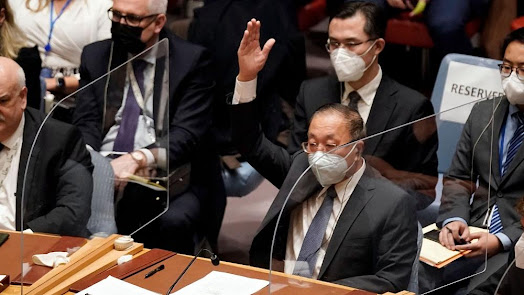
Dr. Tahmoures Gholami – Expert on international affairs
The Chinese and Russian governments have been engaged in extensive political and economic cooperation in recent years. The two countries have common interests in Central Asia and in the form of the Shanghai Cooperation Organization and at the international level, their political convergences are increasing. On the other hand, in the US national security documents both countries have been mentioned as a threat for the global position of the United States and Russia has been cited as a threat to international order. This has led China and Russia to reach some common understanding of the need for cooperation.
When the United States and Western countries talked about the possibility of a Russian invasion of Ukraine, the Russian president went to China and met with the president of that country under the pretext of the Beijing Winter Olympics. From that time, it was thought that in the case of Ukraine Russia had opened a special account for China’s economic aid. With the Russian invasion of Ukraine on February 24, 2022, the Chinese government was in a position to take a stand. The Russian president had a televised talk with his Chinese counterpart. During the talk, the Chinese president stated that he understood Russia’s security concerns on the part of NATO and the West. China’s stance was then interpreted as legitimizing Russia’s action.
With the cohesive response of the West to Russia and the imposition of tough sanctions on Moscow, China’s position gradually became more moderate and obscure. China voted against the UN General Assembly resolution, reiterating its support for maintaining territorial integrity of countries and opposing war in its subsequent positions and, on the other hand, denouncing Western sanctions against Russia and NATO’s expansion to the West. Therefore, the Chinese government neither explicitly supported Russia’s invasion of Ukraine nor explicitly condemned Russia’s invasion of Ukraine. In order to understand the Chinese ambiguous and equivocal positions, a few important points need to be considered:
First, China is well aware that weakening Russia or defeating Putin has strategic consequences for that country. This means that in the absence of Russia, China will become the only major world power which would be placed under the US attention, and the United States will be able to focus on China more easily. Furthermore, the weakening of Russia could be lead to the formation of insecurity sources in Central Asia, with serious consequences for China.
Second, Chinese strategists are assessing that the more the United States is involved in other parts of the world, the less likely it is to focus on China and East Asian issues, and that this is like buying time for China to make further growth. From this perspective, if the United States suffers from an erosive conflict in areas such as Eastern Europe or the Middle East, Washington’s freedom of action in East Asia will be diminishing. From this perspective, the Chinese may be willing to help Russia so that Moscow can engage the United States more in East Asia.
Third, under the current situation, economy is the first priority for China and it does not want its economy be damaged in the confrontation between Russia and the West. On the other hand, when China considered the volume of sanctions imposed on Russia in the shortest possible time, it was concerned about the negative consequences of those sanctions on its economy and its trade initiatives. Therefore, if the first two points encourage China to assist Russia in the war against Ukraine, this factor will cause China to be caution and restraint in its open and naked proximity to Russia.
The fourth point is the lesson of the Ukraine war in the case of Taiwan issue. Chinese officials are likely to keep in mind that Russia’s success in gaining control over parts of Ukraine will create the possibility that one day China could annex Taiwan by military means if necessary. But the sharp reaction based on Western sanctions against Russia has worried Chinese officials. This means that they too may face Western sanctions if they try to dominate over Taiwan through military aggression. There is a concept in international politics called sociability and learning, which means that governments learn from the behavior and fate of other governments and try not to repeat the behavior of governments that has cost them dearly. Perhaps the West, by imposing severe sanctions on Russia, sent this message to Beijing that what consequences would be entailed if China takes similar behavior against Taiwan.
Therefore, in the conclusion, it should be said that China’s position of “neither support nor opposition” to Russia’s war against Ukraine is due to the fact that this country has some strong motives to support Russia and Moscow’s victory over the West and, on the other hand, is also concerned about the negative consequences of Russian sanctions and their repetition in its case.

No comments:
Post a Comment